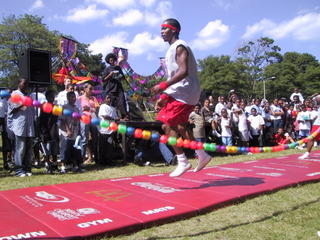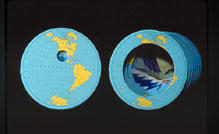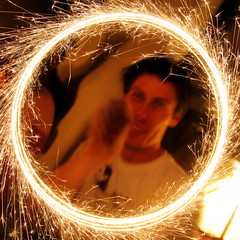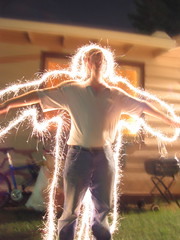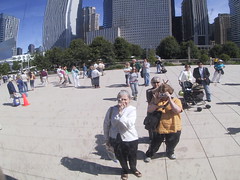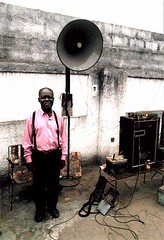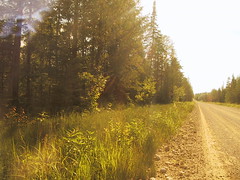A Place Where Women Rule
All-Female Village in Kenya Is a Sign Of Burgeoning Feminism Across Africa
By Emily Wax
Washington Post Foreign Service
UMOJA, Kenya -- Seated cross-legged on tan sisal mats in the shade, Rebecca Lolosoli, matriarch of a village for women only, took the hand of a frightened 13-year-old girl. The child was expected to wed a man nearly three times her age, and Lolosoli told her she didn't have to.
The man was Lolosoli's brother, but that didn't matter. This is a patch of Africa where women rule.
Rebecca Lolosoli, the matriarch of an all-female village in Kenya that offers a haven to those fleeing forced marriages or abuse, sits with a group of women and children. (By Emily Wax -- The Washington Post)
"You are a small girl. He is an old man," said Lolosoli, who gives haven to young girls running from forced marriages. "Women don't have to put up with this nonsense anymore."
Ten years ago, a group of women established the village of Umoja, which means unity in Swahili, on an unwanted field of dry grasslands. The women said they had been raped and, as a result, abandoned by their husbands, who claimed they had shamed their community.
Stung by the treatment, Lolosoli, a charismatic and self-assured woman with a crown of puffy dark hair, decided no men would be allowed to live in their circular village of mud-and-dung huts.
In an act of spite, the men of her tribe started their own village across the way, often monitoring activities in Umoja and spying on their female counterparts.
Rebecca Lolosoli
Rebecca Lolosoli, the matriarch of an all-female village in Kenya that offers a haven to those fleeing forced marriages or abuse, sits with a group of women and children. (By Emily Wax -- The Washington Post)
What started as a group of homeless women looking for a place of their own became a successful and happy village. About three dozen women live here and run a cultural center and camping site for tourists visiting the adjacent Samburu National Reserve. Umoja has flourished, eventually attracting so many women seeking help that they even hired men to haul firewood, traditionally women's work.
The men in the rival village also attempted to build a tourist and cultural center, but were not very successful.
But the women felt empowered with the revenue from the camping site and their cultural center, where they sell crafts. They were able to send their children to school for the first time, eat well and reject male demands for their daughters' circumcision and marriage.
They became so respected that troubled women, some beaten, some trying to get divorced, started showing up in this little village in northern Kenya. Lolosoli was even invited by the United Nations to attend a recent world conference on gender empowerment in New York.
"That's when the very ugly jealous behaviors started," Lolosoli said, adding that her life was threatened by local men right before her trip to New York. "They just said, frankly, that they wanted to kill me," Lolosoli said, laughing because she thought the idea sounded overly dramatic.
Sebastian Lesinik, the chief of the male village, also laughed, describing the clear division he saw between men and women. "The man is the head," he said. "The lady is the neck. A man cannot take, let's call it advice, from his neck."
"She's questioning our very culture," Lesinik said in an interview at a bar on a sweltering afternoon. "This seems to be the thing in these modern times. Troublemaking ladies like Rebecca."
In a mix of African women's gumption and the trickling in of influences from the outside world, a version of feminism has grown progressively alongside extreme levels of sexual violence, the battle against HIV-AIDS, and the aftermath of African wars, all of which have changed the role of women in surprising ways.
A package of new laws has been presented to Kenya's parliament to give women unprecedented rights to refuse marriage proposals, fight sexual harassment in the workplace, reject genital mutilation and to prosecute rape, an act so frequent that Kenyan leaders call it the nation's biggest human rights issue. The most severe penalty, known as the "chemical castration bill," would castrate repeatedly convicted rapists and send them to prison for life.
In neighboring Uganda, thousands of women are rallying this month for the Domestic Relations Bill, which would give them specific legal rights if their husbands take a second wife, in part because of fear of HIV infection.
Eleven years after the genocide in Rwanda, in which an estimated 800,000 people were killed, women in the country hold 49 percent of the seats in the lower house of parliament. Many of them are war widows who have said they felt compelled to rise up in protest after male leaders presided over the 1994 slaughter of Tutsi tribal members by the Hutu majority.
Across the continent in West Africa, Nigerian women are lobbying strongly for the nomination of more women politicians, including a president in 2007, saying that men have failed to run the country properly.
Focusing on the meeting of Group of Eight leaders in Scotland this week, female activists said they hoped international aid intended for Africa would include funding for women who are seeking rights in their court systems and more representation in their statehouses.
"We are at the start of something important for African women," said Margaret Auma Odhiambo, a leader of western Kenya's largest group for widows. The members are women whose husbands have died of AIDS complications.
Lolosoli's effort to speak out for change in her patch of the continent shows the difficulties of changing the rhythm and power structure of village life. Before Lolosoli even went to the U.N. conference, she was going house to house in the nearby town of Archer's Post, telling women they had rights, such as to refuse to have sex with their husbands if they were being beaten or ill-treated.
"A woman is nothing in our community," she said, referring to the members of her tribe, including the men in the village across the road.
"You aren't able to answer men or speak in front of them whether you are right or wrong," she said. "That has to change. Women have to demand rights, and then respect will come. But if you remain silent, no one thinks you have anything to say. Then again, I was not popular for what I was saying."
At the U.N. conference in New York, Lolosoli said, she and other women from around the world bonded as they watched an episode of "Oprah" that focused on women, verbal abuse and cheating husbands.
"You just cry and cry," sighed Lolosoli, who said many men in her tribe still take several wives. "Then again, I was really inspired to know that a lot of women face challenges of this nature and make it."
When she came back to Kenya, armed with ideas and empowerment training workbooks, she stood her ground even when some of the men filed a court case against her, seeking to shut down the village.
"I would just ignore the men when they threw stones at me and ask, 'Are you okay? Are your children okay? Are your cows okay?' " she said. Her tactic and calm reaction was disarming, she recalled. "After everything, they weren't going to stop us."
Lolosoli is still battling her brother over his attempt to marry the 13-year-old.
But lately, the residents of the men's village have been admitting defeat. They are no longer trying to attract tourists. Some have moved elsewhere. Others have had trouble getting married because some women in the area are taking Lolosoli's example to heart.
"She has been successful, it's true." sighed Lesinik, who said maybe he is a little bit jealous. He then shrugged and said, "Maybe we can learn from our necks. Maybe just a little bit."



